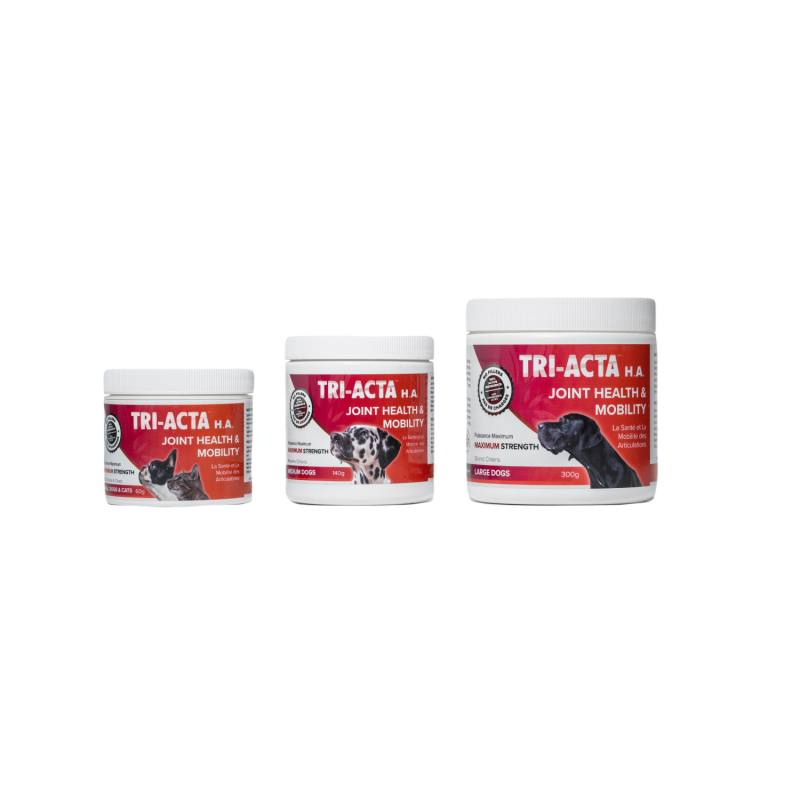Table of Contents
It’s a harrowing experience when your once energetic dog suddenly stops wanting to run, jump, and play like they used to. Sometimes, dogs can be romping around the backyard normally, but one miscalculated jump can cause them to land unexpectedly.
Your pup could be fine after this acrobatic feat, but other times they can show signs of a joint injury—limping, whining, and holding the affected leg off the ground.
It can be tough to tell how serious a joint injury is—if it’s just a sprain, strain, or something that needs surgical intervention. When you whisk off your dog to the vet, chances are they will prescribe dog inflammation medicine to relieve your dog’s pain while developing a plan for your dog’s recovery from their injury.
Dog inflammation medicine, like other veterinary medicines, is similar to the ones that people take—but specially made to be safe for dogs. The anti-inflammatory medication helps reduce swelling and pain so your dog can relax and feel more comfortable as their body heals.
But while dog inflammation medicine has many benefits for helping your pup suffering from an injury or other condition, there are some serious side effects that you should be aware of before giving this medication to your dog. Plus, it’s important to know about alternatives, which are often safer, to dog inflammation medication that are available in case you wish to explore those options instead.
What Is Dog Inflammation Medicine
When your pup needs pain relief, your veterinarian will often prescribe dog inflammation medicine, which is also called a non-steroidal anti-inflammatory drug (NSAID). Inflammation is your dog’s natural response to an injury, resulting in redness, warmth, swelling, and pain in the affected area. NSAIDs reduce these responses by affecting the production of certain substances, mainly prostaglandins, which are a group of lipids that perform hormone-like actions, and that your dog’s body naturally produces at sites of tissue damage or infection.
By reducing the production of prostaglandins and affecting other natural responses to injury or infection in your dog’s body, pain and further damage to the affected area are reduced, allowing your dog to feel more comfortable while the area heals.
When is Medicine for Dog Inflammation Prescribed?
NSAIDs can be prescribed after your dog has surgery (such as for a spay or neuter), if they’ve suffered a cut or wound, or for a joint injury or chronic joint condition like dog arthritis or dog hip dysplasia to relieve pain.
Arthritis in dogs, also called osteoarthritis, causes the cartilage in your dog’s joints to break down and not regenerate, meaning that over time the bones in your dog’s joints end up rubbing together instead of having that cushion from the cartilage to protect them.
The continuous rubbing is not only painful, but it causes all sorts of nasty secondary effects:
- Muscle wasting
- Thickening and scarring of the joint membrane
- Increased fluid within the joint
- Soft-tissue swelling around the joint
- Bony outgrowths
- Hardening and thickening of the bone beneath the cartilage
- A narrowed joint space
- General lame dog symptoms
When your dog is suffering from some or all of these effects of arthritis it’s clear as to why your vet would prescribe painkillers to help them feel more comfortable.
The Benefits of Dog Anti-inflammatory Medication
Just like in humans, NSAIDs help reduce swelling, stiffness, pain, redness, and more in your dog. Dog inflammation medicine is specially formulated to work with your dog’s body, so it’s important to not give them anything from your medicine cabinet and stick to vet-prescribed medications. Here are some more benefits of dog anti-inflammatory medication:
Relieves Pain as Your Dog Heals
Pain does a lot of things to your dog’s body–increases their stress levels, and blood pressure and contributes to them feeling scared and anxious. Just like in humans, pain management with NSAIDs helps with the healing process by preventing a constant pain response. NSAIDs help make your dog more comfortable so they can actually relax as their body heals. While dog inflammation medication doesn’t help the injury heal directly, its ability to reduce pain helps prevent your dog from suffering physically and psychologically while they are recovering from surgery or an injury.
Can Be Used as Part of a Treatment Plan for Chronic Conditions
When your dog has a chronic condition, it means that it can’t be healed—they will have it for the rest of their lives. But that doesn’t mean they constantly have to be in pain or discomfort. To support your dog and help them be as comfortable as possible, it’s important to create an effective treatment plan alongside your veterinarian.
Part of this treatment plan often includes the use of NSAIDs. However, many dog owners will incorporate other treatment options alongside the use of NSAIDs, like supplements and/or physical therapy, to manage pain.
For example, a dog that’s experiencing arthritis is likely to be prescribed NSAIDs, but dog owners can also give their pup joint supplements. A dog joint supplement TRI-ACTA contains 100% natural ingredients like glucosamine for dogs, methylsulfonylmethane (MSM, a naturally occurring anti-inflammatory), and chondroitin, which assists with protecting and supporting your dog’s joint health, including helping with cartilage repair and development, reducing inflammation, and strengthening the muscles and ligaments surrounding the joints.
Our regular-strength TRI-ACTA is the perfect preventative dog joint supplement for dogs that don’t currently have joint issues but you still want to provide them with extra protection. Our extra-strength formula, TRI-ACTA H.A., includes hyaluronic acid, which strengthens the synovial fluid in your dog’s joints and eliminates inflammation allowing for easier and more pain-free movement.
Because TRI-ACTA is made with completely natural ingredients, there’s no possibility of negative side effects with your dog, whether it’s given alone or alongside dog medication for inflammation.
TRI-ACTA H.A. for Pets
Our maximum strength formula is optimally designed to accelerate the formation of cartilage, minimize inflammation, expedite the healing process, and improve joint conditions.

What Should You Discuss With Your Veterinarian Before Giving Your Dog Medication for Inflammation
Based on your dog’s symptoms and condition, your vet will weigh the potential risks with the benefits offered by the medication and provide you with a recommendation. This recommendation will include the dosage and frequency at which you should give your dog the medication. Of course, it’s always a good idea to discuss the pros and cons of giving your dog NSAIDs with your veterinarian and ask them any questions you may have.
Some potential questions you can ask your veterinarian before you give your dog inflammation medicine include:
- The type of NSAID and why this type is being prescribed (we discuss different types of dog anti-inflammatory medication in a section below)
- The dosage amount and frequency of administration (how often you should give the medicine to your dog)
- How long do you need to give the dog inflammation medicine—longer often increases the risks associated with the medication
- Possible side effect
- Potential interactions with other medications your dog may be taking
- Any diet changes that may be necessary with medicine for dog inflammation
- Your dog’s medical history, including any previous reactions from medications they’ve taken in the past
What Side Effects Should You Watch for in Dog Medicine for Inflammation?
While dog inflammation medicine can help your dog feel more comfortable when they are dealing with pain, there is the potential that your dog may experience side effects that can range from minor to severe.
The table below outlines different side effects that dog inflammation medicine can cause and a basic overview of why these side effects occur:
|
Dog Medication for Inflammation Side Effect |
High-Level Reason for Side Effect Occurring |
|
Gastrointestinal effects (vomiting, diarrhea, ulcers, perforation of gut wall) |
Prostaglandins, such as PGE1 and PGI2, have gastrointestinal protective effects like maintaining mucosal blood flow and mucus production, and decreasing acid secretion. NSAIDs inhibit the production of these prostaglandins, which can result in the aforementioned effects. |
|
Renal effects |
NSAIDs inhibit the function of prostaglandins PGE2 and PGI2, which impacts renal blood flow and perfusion (normal urine output). While dogs with healthy kidneys are less likely to have issues, dogs with already reduced kidney function are more likely to see serious side effects from the reductions. |
|
Hepatic toxicity (liver inflammation) |
Inflammation or toxicity of the liver can be caused by:
The reaction is thought to be caused by your dog’s immune system as a response to the formation of NSAID acyl glucuronide metabolites (reactive metabolites, which in the medical world means bad). It’s hard to predict the risk of this happening in dogs, but elderly dogs and dogs with a previous history of liver issues may be at a higher risk. |
The biggest takeaways that you should keep in mind from the literature provided on the possible side effects of dog inflammation medicine are:
- If your dog already has issues with their kidneys, liver, or digestive system, NSAIDs should be used with caution and with regular blood and/or urine tests at your vet to determine if the medication is having a negative effect on your dog’s system.
- If you have an old dog, their weakened systems may not be able to tolerate NSAIDs well. Dosage amounts and frequency should be carefully monitored, as well as your dog’s condition while taking the medication.
- The longer your dog takes NSAIDs, the higher the risk of an adverse reaction. A veterinarian should carefully monitor any prolonged use of NSAIDs.
- Higher dosage amounts further increase the risk of adverse effects. The higher the dose of the dog inflammation medication, the more effect it has on your dog’s body, increasing the risk of adverse effects. Dosages and frequency of administration should also be kept as low as possible.
What Should You Do if Your Dog Has a Side Effect on Dog Anti-Inflammatory Pills?
If your dog ends up having an adverse reaction to the dog inflammation medicine, the most important first step is to stop giving your dog the medication and call your veterinarian. Even a minor reaction can become severe if not treated immediately. If the reaction happens in the middle of the night or during off hours, you may need to take your dog to an emergency veterinarian. In this case, be sure to get copies of any treatment information and medications that the emergency vet prescribes, or have the emergency vet email the information to your regular vet so that you can discuss the information with your regular vet when you can.
Sometimes, your veterinarian may want to contact the company that manufactures the NSAID they prescribed to your dog. The manufacturer may have specific recommendations for tests and treatments that will help your dog.
When Should You Administer Medicine for Dog Inflammation?
If your dog is showing signs and symptoms of being in pain, you should take your dog to the vet, where they will use their expertise and experience to decide two things:
- If your dog needs anti-inflammatory medication in the first place, or if their condition and/or medical history means that an alternative treatment is a better option (we’ll get into alternatives to dog anti-inflammatory medication later on in this article)
- The dosage amount and administration schedule for the dog inflammation medicine, which is the strength of the medication, and how often it should be given to your dog
Once these two important decisions are made, your role is to give your dog their medication following the directions set out by your veterinarian.
Sometimes, your veterinarian will follow the dosage and administration frequency that the manufacturer of the medication recommends. In other cases, your vet may alter the dosage (stronger or weaker) or tell you to give the medication to your dog less or more frequently than the recommendations set out by the manufacturer.
The amount of time your dog takes the NSAID is also important to consider. The longer that your dog takes NSAIDs, the more risk they have of developing serious conditions
The Types of Dog Anti-Inflammatory Medications
There are a variety of different types of dog medication for inflammation that you can consider, including dog anti-inflammatory pills, dog anti-inflammatory tablets (chewable), and dog anti-inflammatory injections.
These types of medications are explained in more detail below:
|
Type of Dog Anti-inflammatory Medication |
Formulation(s) |
|
Carprofen (marketed under various brand names and generics) |
Chewable tablet |
|
Deracoxib (brand names: DERAMAXX, DOXIDYL) |
Chewable tablet |
|
Firocoxib (brand names: PREVICOX, FIROX, EQUIOXX) |
Chewable tablet or oral paste |
|
Grapiprant (brand name: GALLIPRANT) |
Chewable tablet |
|
Meloxicam Injectable (marketed under multiple brand names and generics) |
|
|
Robenacoxib (Brand name: ONISOR) |
|
|
Corticosteroids (Prednisone, Prednisolone, Methylprednisolone, Dexamethasone) |
|
- Chewable dog anti-inflammatory tablets are the easiest to administer because they often come flavoured and dogs usually see them as a treat rather than medication.
- Regular dog anti-inflammatory pills are a bit more difficult to give your pup, as they usually need to be hidden in an irresistible treat (like a piece of cheese or a chunk of hot dog) otherwise, your pup may not eat it. Some dogs are savvy enough to recognize the pill even when it’s hidden in a treat, so if you have a dog that doubles as a medication detective, you might have to try techniques for giving a dog a pill to make the process easier and avoid having to shove the pill down their throat.
- Injectables can be easy or difficult to administer, depending on your dog. In some cases, your vet will need to administer the medication for you, but a dog anti-inflammatory injection tends to last longer than oral medication, so you’ll likely only have to visit your vet once every few weeks or longer. If giving a dog anti inflammatory injection yourself, your vet will provide training to make sure that you can do it properly.
What Alternatives Are There for Anti-Inflammatory Medicine for Dog
To eliminate the chances that your dog will experience any serious side effects, you may wonder what alternatives to dog inflammation medicine are available. Thankfully, you have options:
Joint Supplements
Many dogs that are prescribed NSAIDs have joint issues, which is why many dog owners have turned to joint supplements to help their pups. Dog joint medicine in the form of supplements is great because it can safely be given to your dog while they are taking NSAIDs. Giving your dog joint supplements alongside NSAIDs is a great way to reduce your dog’s reliance on dog inflammation medicine over time, with the goal of either significantly reducing the dosage of the anti-inflammatory or eliminating it altogether. Make sure to look for a joint supplement that has glucosamine, chondroitin, and MSM, like TRI-ACTA, which has natural anti-inflammatory properties.
TRI-ACTA H.A. for Pets
Our maximum strength formula is optimally designed to accelerate the formation of cartilage, minimize inflammation, expedite the healing process, and improve joint conditions.

Physical Therapy
Usually, humans need some sort of physical therapy after a major surgery or traumatic accident to help them heal, and our pups are no different. Keeping your dog’s joints moving in a safe and controlled environment is important, as it helps strengthen the muscles, ligaments, and tendons surrounding the joint.
Different types of therapies for dog joint health include:
1. Hydrotherapy
Swimming is a great way to work joints while at the same time reducing the amount of pressure put on them. Your dog’s body is buoyant in the water, meaning that gravity is reduced, so the weight of their body isn’t affecting their joints. Usually, hydrotherapy will occur in a pool where your dog can freely swim around or in a specialized chamber filled with water and a treadmill. Your dog can walk on the treadmill directly while the water reduces the weight on their joints.
2. Laser Treatment
By using specialized tools, trained veterinarians are able to target specific areas on your dog’s body with lasers, which work to promote the healing of damaged tissue without affecting the healthy tissue surrounding it. In a nutshell, laser therapy stimulates electrons and activates cells, which promotes growth, proliferation, and repair.
3. Massage Therapy
Who doesn’t love a good massage? Humans sure do, and so will your pup! Massages help increase circulation, which helps promote healing, as well as break up adhesions (scar tissue) that contribute to stiff connective tissues. Massages can also help reduce pain and inflammation and help relieve muscle spasms. Constricted muscles are loosened during a massage, allowing your dog to move around more easily.
4. Stretching
Similar to massage, stretching your dog’s joints (after receiving training from a physical therapist) helps loosen stiff muscles, ligaments, and tendons, which increases your dog’s range of motion. Over time, any atrophied structures can be worked so that they can function normally again. Stretching also helps relieve the pain caused by stiff joints.
5. Acupuncture
By using specialized needles, acupuncture therapists for dogs target specific areas of your dog’s body that are inflamed or causing pain to relieve it. The acupuncture points are called meridians, which are said to be energy channels that transmit energy throughout your pup’s body. Placing the needles in these points encourages blood circulation, improving healing. Acupuncture also stimulates your dog’s nervous system, which encourages the body to release endorphins that have anti-inflammatory and pain-relieving properties.
Summary
When your dog is in pain, it’s often a difficult experience for you and your pup. No dog owner wants to see their dog in distress and your pup doesn’t understand what’s happening to them. Dog inflammation medicine is a great way to relieve your pup’s pain, but it’s important to understand the potential side effects and the medication's benefits.
Many pet owners choose to combine dog inflammation medicine with a joint supplement to significantly reduce the needed dosage of anti-inflammatory medicine for dogs or eventually eliminate the need for the medication altogether.
If you need a joint supplement to help reduce or eliminate the amount of pain medication your dog takes daily, consider trying TRI-ACTA H.A. This extra-strength joint supplement will have your pup up and running in no time.
TRI-ACTA H.A. for Pets
Our maximum strength formula is optimally designed to accelerate the formation of cartilage, minimize inflammation, expedite the healing process, and improve joint conditions.

Purchase TRI-ACTA H.A. online or learn where to buy in a store near you.
Newsletter Signup
Subscribe to our newsletter to receive the latest news and exclusive offers.
.jpg?height=2000&name=Cliick_Integricare-DISPLAY-REVISEDV2%20(1).jpg)
Proactive & Therapeutic Joint Supplements
When given daily, Integricare joint supplements recover bone and joint injuries faster and help prevent mobility injuries from happening in the first place.











